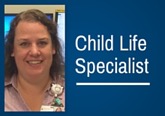 Listening to Families
Listening to Families
As part of the palliative care team, Cora Welsh, a child life specialist at Johns Hopkins Children’s Center in Baltimore, says, “Our goal is to hear what’s important to the family, and what extra supports they need to help them meet their children’s needs. We’re a complement to care working alongside the medical team. We fill in any gaps or needs not being met.”
When she meets a family, Ms. Welsh’s primary goal is to figure out what brings joy to their baby, child, or adolescent. She asks them to describe the best part of the day and explain what makes it the best. Then, she uses that information to determine how the team can provide more joy in whatever context is appropriate: home, hospital, or elsewhere.
The next step is helping that child’s voice be heard, regardless of where they are developmentally. “A 17-year-old’s voice is going to be different than someone who is, developmentally, a three-year-old,” Ms. Welsh explains. “We want the family to hear it, but we [especially] want to make sure the hospital or clinic hears it loud and clear.”
Finally, Ms. Welsh looks for things the family can do together. “I do arts and crafts and memory-making activities. I try to frame all those activities in terms of what fun things the family can do together,” she says, noting that it could be “something as simple as making a scrapbook, or taking their baby outside to feel snow on their face.”
There may also be times when a child doesn’t want to include their parents. Ms. Welsh explains, “When a child is old enough to express his or her desires, I try to give them the freedom to do that. I’ll find ways to talk to parents about why it’s important to give their child that space.”
Sometimes, her job involves helping families come to terms with an uncertain reality while achieving the best life possible.
“Palliative care is for kids with very complicated illnesses... [who] spend quite a bit of time in medical care,” says Ms. Welsh. But they are still children-children who are trying to live within the context of their illnesses. “Seventy-five percent of our patients will be in the hospital for a little while, then go home and live with their families. We want to facilitate that as much as we can,” she says.
Ms. Welsh appreciates that, as tough as it can be for children and families coping with serious illnesses, “they are just trying to live their lives.” She believes that the top two benefits of pediatric palliative care are continuity of care and the amount of time that team members spend with patients and families. “I get the chance to establish a connection with parents and caregivers,” says Ms. Welsh. “We make a very serious effort to do that.”





